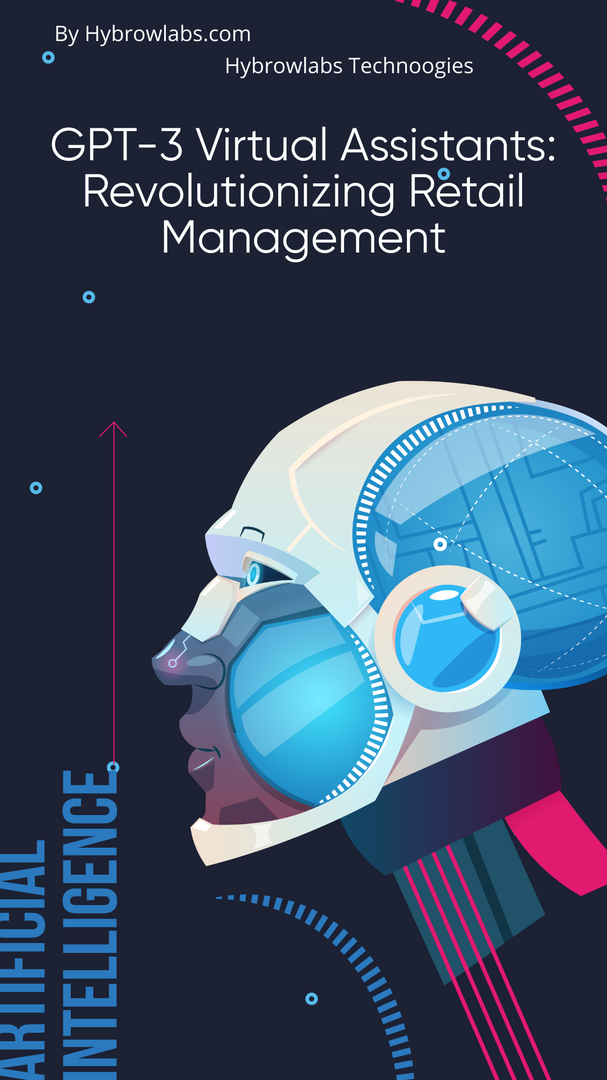
GPT-3-powered virtual assistants are revolutionizing retail management as a result of the development of artificial intelligence. Virtual assistants are a valuable resource for shops that want to stay ahead of developments since they can optimize processes, make personalized recommendations, and offer real-time customer support. In this article, we'll examine how GPT-3-enabled virtual assistants are revolutionizing the retail sector and explain why both companies and customers should pay attention to this ground-breaking innovation.
What are GPT-3 enabled virtual assistants and how they work?
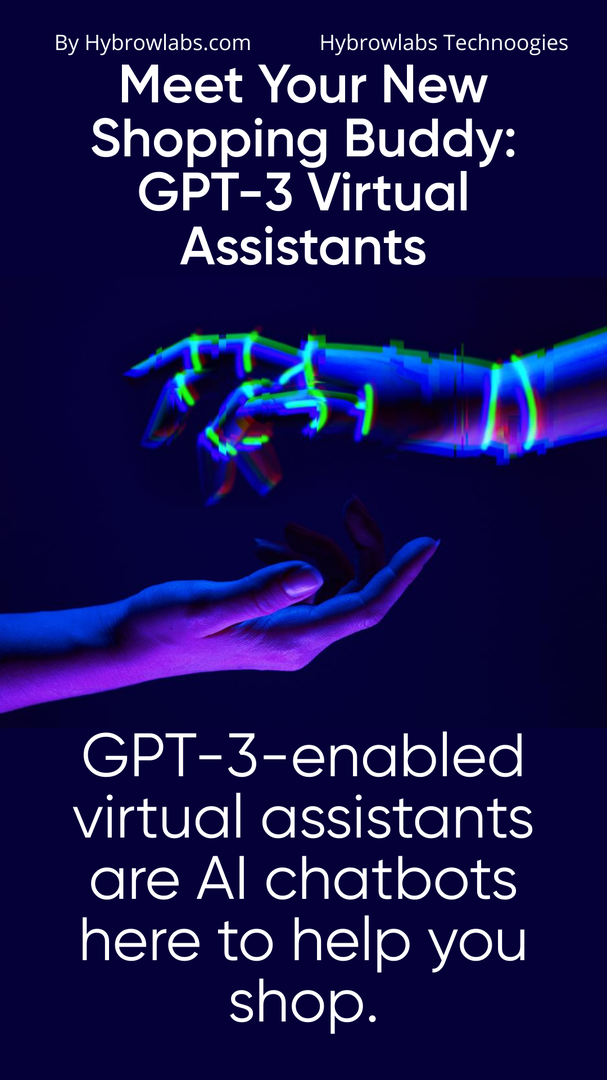
GPT-3 stands for Generative Pre-trained Transformer 3. It is an advanced language model developed by OpenAI that uses deep learning techniques to generate human-like responses to text input. GPT-3 enabled virtual assistants are AI-powered chatbots that use GPT-3 technology to interact with customers and provide real-time assistance. By employing a sophisticated algorithm to examine the words you use to engage with virtual assistants, GPT-3 made it possible for them to function able to comprehend the meaning of your words and react appropriately. It's like having a personal assistant who can quickly and effectively give you the information or support you require by getting to know your requirements and preferences.
Looking for some cool and innovative virtual assistants that are powered by GPT-3? Check this out:
Here are some examples of GPT-3 enabled virtual assistants used for retail management along with an explanation of how they work:
1. Hugging Face:
This virtual assistant uses GPT-3 to understand natural language input from customers and provide personalized product recommendations, answer inquiries, and even help with the checkout process. For example, if a customer asks, "Do you have any vegan-friendly shoes?", Hugging Face can understand the intent behind the question and provide relevant product recommendations.
2. Netomi:
This AI-powered virtual assistant uses GPT-3 to analyze customer inquiries and provide fast and efficient support. For instance, if a customer asks, "Can I track my order?", Netomi can use GPT-3 to understand the intent behind the question and provide a personalized response, such as a tracking link or estimated delivery time.
3. Kore.ai:
This virtual assistant is designed to help retailers automate their customer service operations by using GPT-3 to understand and respond to customer inquiries. For example, if a customer asks, "How do I return an item?", Kore.ai can use GPT-3 to provide a detailed response, including instructions on how to initiate a return and any associated deadlines or fees.
4. Receptiviti:
This AI-powered virtual assistant uses GPT-3 to analyze customer data and provide insights into their preferences and behavior. For instance, by analyzing customer interactions with a retailer's website or social media channels, Receptiviti can help retailers identify areas for improvement, such as product recommendations or customer support processes, and make data-driven decisions to enhance the customer experience.
Exploring the advantages of GPT-3 enabled virtual assistants for retail businesses:
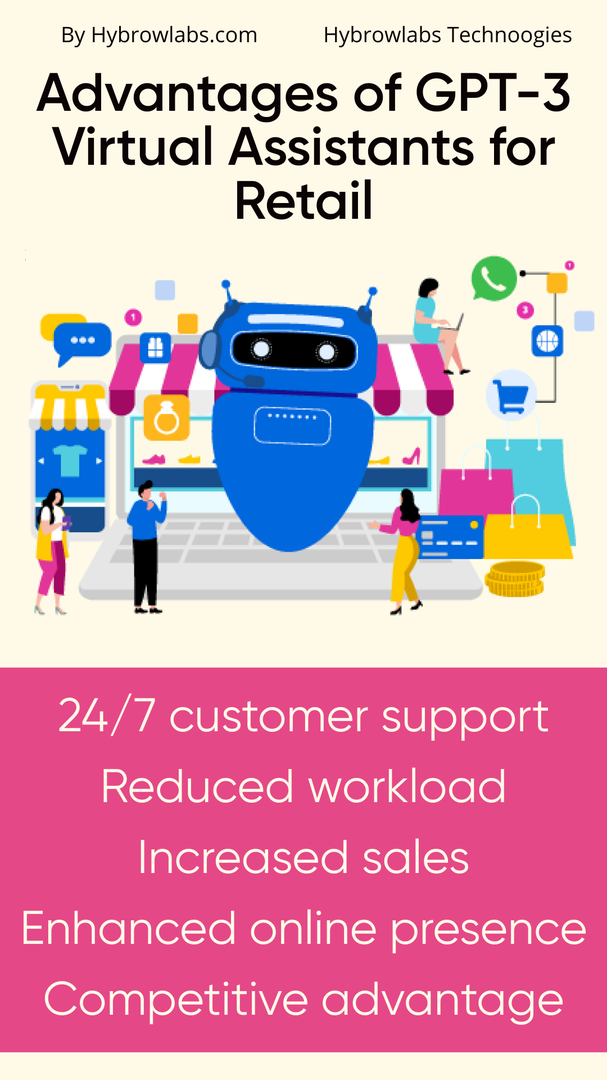
1. 24/7 customer support:
With GPT-3 virtual assistants, retail businesses can provide round-the-clock customer support, which is essential in today's fast-paced world. This ensures that customers can get their queries answered and problems resolved at any time of the day.
2. Reduced workload for human staff:
GPT-3 virtual assistants can handle multiple queries simultaneously, reducing the workload on human customer service representatives. This frees up staff to focus on other important tasks like engaging with customers and driving sales.
3. Personalized recommendations:
With the ability to analyze customer preferences and purchase history, GPT-3 virtual assistants can provide personalized product recommendations to customers. This enhances the shopping experience and increases the likelihood of customers making a purchase.
4. Increased customer satisfaction:
GPT-3 virtual assistants can provide fast and accurate responses to customer queries, leading to increased customer satisfaction levels. Satisfied customers are more likely to make repeat purchases and recommend the business to others.
5. Increased sales:
With personalized recommendations and improved customer service, GPT-3 virtual assistants can increase sales for retail businesses. This is because customers are more likely to make a purchase when they receive personalized recommendations and have a positive shopping experience.
6. Enhanced online presence:
GPT-3 virtual assistants can interact with customers online, providing a seamless shopping experience across different channels, including social media and messaging apps.
7. Competitive advantage:
Retail businesses that implement GPT-3 virtual assistants gain a competitive advantage by providing superior customer service and personalization.
How are Retailers Leveraging GPT-3 Technology? Exploring Real-Life Applications of GPT-3 enabled virtual assistants in retail:
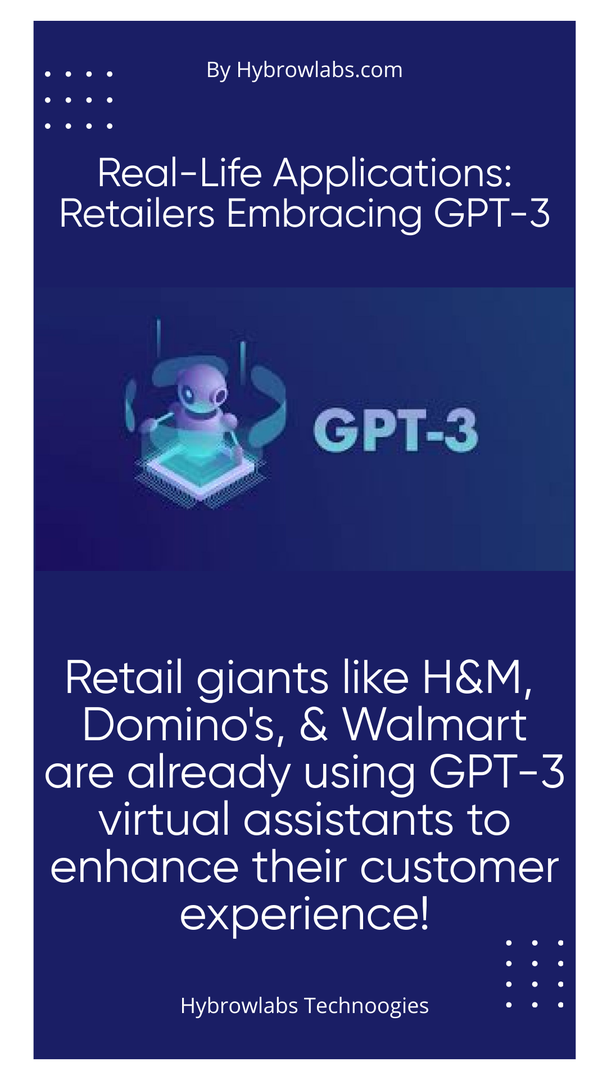
GPT-3-enabled virtual assistants have become increasingly common in the retail industry, with many businesses adopting this technology to improve their customer experience. Here are some real-life examples of GPT-3 enabled virtual assistants in retail:
1. H&M:
H&M's virtual assistant is a game-changer for the fashion industry. The virtual assistant can comprehend natural language with the aid of GPT-3 technology and offer consumers individualized recommendations. Consumers can ask inquiries in a chat session with the virtual assistant and receive answers. Depending on the client's tastes and past purchases, the virtual assistant can also aid clients in finding products and making outfit recommendations.
2. Sephora:
Sephora's virtual assistant is designed to help customers with their beauty needs. The virtual assistant can help customers find the right products for their skin tone and type, provide makeup tips, and suggest beauty products based on their preferences. The virtual assistant can also help customers track their orders and get updates on the status of their delivery.
3. Domino's Pizza:
Domino's Pizza's virtual assistant is a great example of how GPT-3 technology can be used to improve the ordering process. Customers can chat with the virtual assistant, place their orders, and get updates on the status of their delivery. The virtual assistant can also answer queries and provide recommendations based on the customer's previous orders.
4. Nordstrom:
Nordstrom's virtual styling assistant is designed to help customers find the perfect outfit. With the help of GPT-3 technology, the virtual assistant can suggest outfits based on the customer's style preferences, body type, and occasion. Customers can chat with the virtual assistant, ask questions, and get immediate responses. The virtual assistant can also suggest accessories and shoes complete the outfit.
Challenges that GPT-3 enabled virtual assistants hold in retail management

Although GPT-3 enabled virtual assistants have revolutionized the retail industry, they also pose some challenges that must be addressed.
1. Potential for bias :
Firstly, the potential for bias in their responses is a significant challenge. Since these virtual assistants learn from human interactions, they may pick up biases that can lead to unintentional discrimination. This could result in a negative customer experience and harm the retailer's reputation.
2. Privacy Concerns:
Secondly, privacy concerns are another challenge associated with GPT-3-enabled virtual assistants. With access to customer data, there is a potential for misuse or unauthorized access, leading to a breach of trust between the retailer and the customer. Retailers need to ensure that the virtual assistants are designed with privacy and security in mind and that customer data is protected at all times.
3. Other limitations:
Lastly, GPT-3-enabled virtual assistants still have limitations in their ability to understand complex queries and provide accurate responses. While they can handle a wide range of simple queries, they may struggle with more complex requests, leading to frustration and a poor customer experience.
How GPT-3 Technology is Transforming the Way We Interact with AI-Powered Assistants?
The way we engage with technology could be completely changed by virtual assistants enhanced by GPT-3 technology. These virtual assistants can comprehend and respond to human language in ways that were previously impossible, thanks to their sophisticated language processing abilities. From making appointment arrangements to making tailored recommendations for goods and services, they can help us with a wide range of tasks.
The OpenAI GPT-3 language model, which has been used to develop a range of virtual assistants for many industries, is one practical example of a virtual assistant enhanced by GPT-3. For instance, in the healthcare industry, GPT-3 powered virtual assistants can aid patients with scheduling appointments, offer medical advice, and even assist doctors in the diagnosis of rare diseases. Virtual assistants in the financial industry can offer investment advice as well as assistance with money management to clients.
There are countless potential uses for GPT-3 augmented virtual assistants, and in the upcoming years, we may expect the emergence of even more cutting-edge use cases. We can anticipate a day in the future when virtual assistants driven by GPT-3 are an essential component of daily life, simplifying and streamlining our work.
What future does enabled virtual assistants hold in retail?
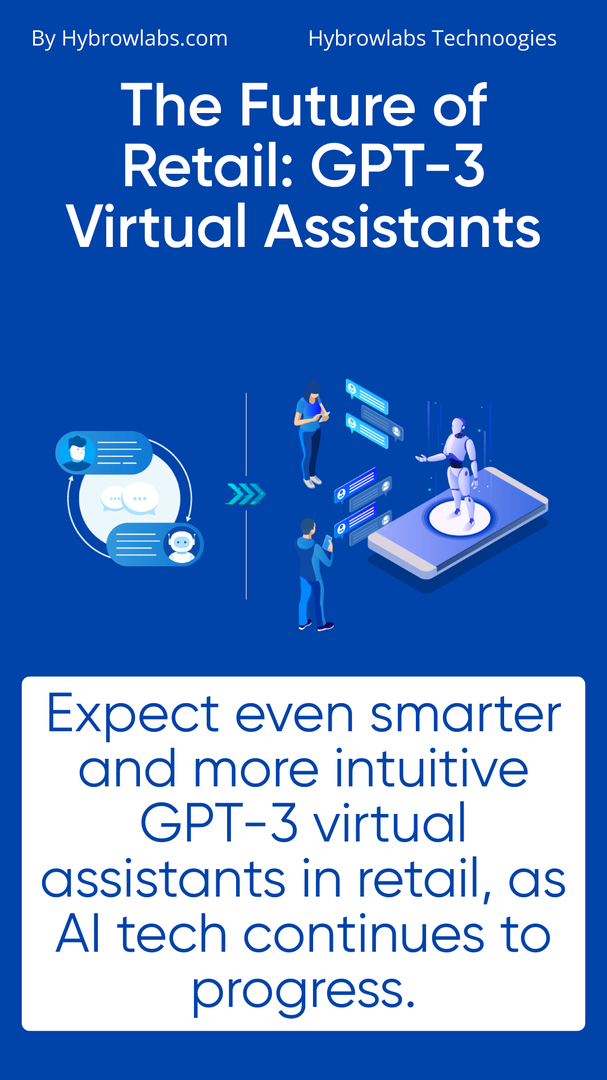
GPT-3-enabled virtual assistants are the future of retail. Virtual assistants are being used by retail companies more and more as a result of the development of AI technology. Customers can enjoy a flawless and customized purchasing experience thanks to these virtual assistants, which help lighten the workload of real customer support personnel. We can expect to see much more sophisticated functions added as the technology underlying GPT-3 enabled virtual assistants continues to progress.
For example, virtual assistants may be able to detect and interpret human emotions, enabling them to provide even more personalized recommendations and assistance. They may also become more intuitive and responsive, allowing for a more human-like interaction with customers.
In addition to enhancing the customer experience, virtual assistants can also help retail businesses to better understand their customers. The data collected by these virtual assistants can be analyzed to identify patterns and trends in customer behavior, which can then be used to improve products and services.
Conclusion:
In conclusion, virtual assistants with GPT-3 capabilities are revolutionizing retail management as we know it. They offer efficient and individualized customer service, boost sales through tailored recommendations, and lighten the pressure on human representatives. Although using them comes with some difficulties, the advantages outweigh the hazards. We may anticipate seeing an increase in the use of virtual assistants by retail organizations to give their customers a smooth shopping experience as AI technology is more used. With GPT-3 capable virtual assistants leading the way, the future of retail management is promising. So let's welcome this new technology and anticipate a shopping experience that is both more individualized and effective. For professional assistance in implementing GPT-3 powered virtual assistants in retail, consider using the Hybrowlabs Development Service.
FAQ’s:
1. What is GPT-3 and how does it work in the retail industry?
GPT-3 is an artificial intelligence language model that uses natural language processing to generate human-like text. In the retail industry, GPT-3 can be used to power virtual assistants that help customers with their shopping experience, from answering questions about products to suggesting personalized recommendations.
2. How will virtual assistants powered by GPT-3 change the way we shop?
Virtual assistants powered by GPT-3 will provide a more personalized and efficient shopping experience. They can quickly answer customer inquiries and provide product recommendations based on a customer's preferences and purchase history. Additionally, they can help customers navigate online stores and complete purchases, making shopping more convenient than ever before.
3. What are some potential challenges of using virtual assistants powered by GPT-3 in retail management?
One potential challenge is ensuring that the virtual assistants accurately understand customer inquiries and provide helpful responses. Additionally, privacy concerns may arise if the virtual assistant collects and uses customer data for advertising or other purposes. Finally, some customers may prefer a human touch and be hesitant to rely solely on virtual assistants.



26035b.png)


a3dc85.jpg)

.jpg)
fd8f11.png)

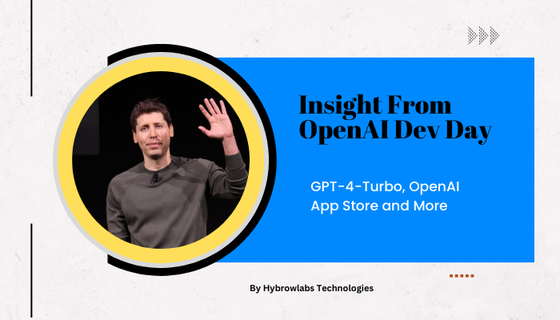
.jpg)
.jpg)